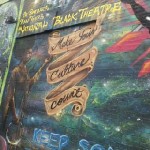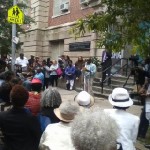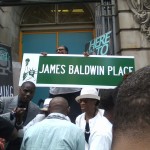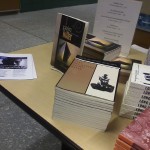I know that the Year of the Horse will go into late January, so the galloping is not over. We have been on a very wild ride. The news of day has often been mysterious, horrific, terrifying or utterly silly. Sometimes the same item can be described with all those words. I know that it has been a wild ride for me and one that I treasure because I am breathing and too many people I love no longer breathe.
Florence Tate whom I only met in “real life” recently passed. I knew her son Greg Tate for what seems like forever. But his famous Mama I met via social media–she was a great presence on Facebook and intensely encouraging to me and many other writers, artists, singers, organizers, activisits and bon vivants. The last time I saw her breathing was at the Funeral for Amiri Baraka–the kind of affair that brought his friends, enemies, former lovers, their children and just about anyone who was a who in the downtown/Black Arts Movement/literary scene to Symphony Hall in Newark. I will also miss Galway Kinnell whose readings at Brooklyn’s Ferry Landings at the end of the Poets House Bridge Walks were so very very special. His passion for life, for poetry for oatmeal LOL never left him. Like Baraka, Kinnell was a fighter for justice; a great teacher–they were poets who created communities and they both lived long enough to modify earlier excesses and mend some fences.
I can’t breathe #Ican’tbreathe has become a chant; an indictment; a statement of anguish and demand. Eric Garner’s utterly unnecessary death at the hands of the NYPD and others who are here to serve people galvanized and continues to galvanize young people on top of those marching/organizing/agitating in Ferguson MO. The parade of dead Black, Brown and occasionally White bodies at the hands of Law Enforcement (LE) has made a significant number of people who had otherwised kept their heads in the sand. look up and see that the police are more soldiers than peace officers and that much of policing has become occupation–the lastest military incursions by the Israel into Gaza serves as a kind of template, it seems to me. These are ugly times. Ugly times.
And yet I am writing on a chilly rainy day in Brooklyn, a piano solo-some minor league European composer’s work makes perfect background noise. Today I went to the Museum of Modern Art to read “Lave” a poem commissioned for the catalog for One Way Ticket: Jacob Lawrence Migrations Series which will open in early April at MOMA. Elizabeth Alexander has done a great job of bringing Black poets with very different poetics together to honor and respond to Lawrence’s seminal work. I know that this was a great opportunity; a great challenge. I hope people will respond to our response. I also saw the Robert Gober Retrospective. Gober is White. He’s Gay and he’s Young and very definitely breathing and I am glad. His sculptures defy standards of beauty; his bodies are never complete; his anguish not extinguished; his fears what should be feared–bullies, killers of the mind as well as body–the title of the exhibition is The Heart Is Not a Metaphor and you know what it is not Pulsating, pumping, a muscle whose only job is to keep the body upright and moving, the heart is beyond compare. And yet even Gober allows the heart, the hearth to become symbols for the ways we attempt to stunt pulsation; to destroy intimacy, charity, erotic impulse.
At the end of this Year of Baldwin; this Year of Losses, public and private; this year of Protests and Counter Protests. The fighting t-shirts: I can’t breathe/I can breathe the year when too many White People found themselves in a racial quagmire of their own making with no understanding of how to get out–I for one listen to the young people who started #blacklivesmatter; who demanded to be heard in at unneeded Al Sharpton organized march; who march and chant and tweet and demand to be able to BREATHE and to have a future. Saludos to you. May we all get off that horse when the Year of the Horse ends, saddle sore, yes, but ready to walk on this altered/altared earth. May we find a way to breathe together in justice, in peace.




